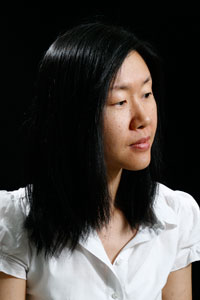I like reading about manus pa. It’s not that I’m curious to particularly know about their lives, I’m actually just interested in what people say about them.
It’s not difficult to distinguish between an ordinary pa (an auntie) and a manus pa (auntie man). Considering my age, I’m definitely a pa in the eyes of many, but I certainly do not wish to be referred to as a manus pa.
I don’t know who coined this term, or when, but it has now become a hot topic on social media, with many Thai netizens openly poking fun at them.
If you are new in our society and haven’t yet had the chance to rub shoulders with one of them just yet, here are some clues to help you identify this curious species the next time you’re out on the Bangkok streets.
This collective term is used to refer to middle-aged or older women (and sometimes men) whose behaviour is considered unacceptable to social norms.
They are not known for their levels of patience or knowledge of rules; that’s why they are often seen jumping queues wherever they go. Manus pa also adore discounts, so you can expect to see plenty of them at any supermarket on a late evening when selected goods usually have discounted prices. There, they will often cause a stir as they fight their way to make sure they get their hands on the choicest items before anyone else.
This would lead many to believe that manus pa are poor but this is not necessarily the case as many are also rather wealthy. Regardless of the income bracket, the general public view them as aggressive and selfish because they show little respect for other people’s rights and don’t seem to care much about how people feel.
Others believe that they often exploit their seniority to gain special privileges — at the expense of other people’s comfort.
I have recently come across many forum posts by those who have come face-to-face with manus pa. In general, they weren’t very happy with their encounters, yet still managed to recount them in humorous ways.
Some compare them to ghosts, saying everybody knows that they exist, but nobody wants to see them. Some say they are more like a lottery in the way that they bring loss to everyone all the same. One of the stories that caught my attention was shared by a young man who claimed that he defeated a manus pa on one occasion by being harsh with her. He seemed to be very proud that he had come up with a way to scare this old lady away before she could “take advantage of” him. He also encouraged everyone on the forum to get tough and give manus pa some lessons.
After having read so many accounts on this issue over the months, I have come to the point where I can’t decide who exactly I should feel for: the young people as “victims” or the older ladies often portrayed as villains.
Like many, I have experienced an encounter with an older person who has exhibited examples of the aforementioned behaviour. Fortunately, however, the sense of respect for seniors that has been instilled in me since I was a child is still strong and it reminds me not to take them so seriously.
There is also a new kind of sympathy developing, possibly because of my advancing age, that makes me feel rather uncomfortable every time I see those older women becoming a target of the fault-finding game by invariably younger people.
I considered it a blessing, therefore, when a professional psychiatrist come out in an attempt to put a stop to this social phenomenon.
In an article he released recently, Dr Kampanart Tansithabudhkun encouraged us all to try to understand the behaviour of these “aunties”, rather than making a fuss about them.
According to his observations, their behaviour could be explained as a result of deep-rooted personal habits that make it hard for them to conform to social etiquette, while improper upbringing within the family might have also contributed to them developing the wrong perception that they are above everyone and so can do whatever they want.
In some cases, they might not intend to cause these disruptions but their declining health, little education and a lack of experience in the modern world have prevented them from properly adapting themselves to the rapidly-changing Thai society.
In the most extreme cases, some might even be suffering from a mental disorder.
The doctor points out that the best way to deal with them should start with ourselves — only after we can keep our emotions in control should we be ready to negotiate with them through using our utmost politeness and patience.
The bottom line is for us to learn to forgive them and move on with our lives. What I found most insightful was when Dr Kampanart suggested that we should imagine how we would feel if our own mothers were those “aunties” and they were treated or talked about in such
a disparaging way.
I hope that the doctor’s advice is taken seriously. I believe that with a more mature perspective, we might realise that they are merely “aunties” in distress who just need a little help and are not unwanted aliens in our society.
Patcharawalai Sanyanusin is a writer for Life section of the Bangkok Post.
